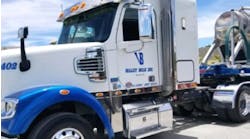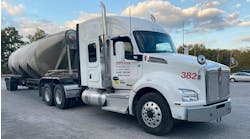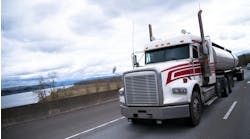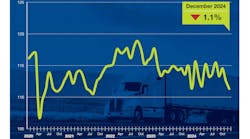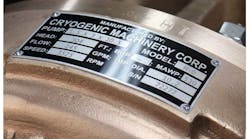BeyondTrucks expands integration hub
PSG acquires cryogenic pump manufacturer
Eagle Transport building diversified tank truck fleet strategy for the future
EAGLE Transport, Rocky Mount, North Carolina, is quietly celebrating its first 50 years this year. Still, the tank truck carrier has plenty to shout about.
Senior managers recently sat down with Bulk Transporter to discuss the Rocky Mount, North Carolina-based tank truck carrier’s achievements during its first half-century and what objectives are targeted for coming decades.
Recent milestones include:
• Being named the American Chemistry Council’s Responsible Care Partner of the Year in 2018.
• Earning the Environmental Protection Agency’s SmartWay Excellence Award three years in a row.
• Nominating company driver Darryl Nowell, who was selected as just the third National Tank Truck Carriers Professional Tank Truck Driver of the Year for 2015/2016.
• Growing into the second-largest petroleum hauler in the United States.
• Establishing a firm foundation for continued expansion into chemical hauling.
“Over the past 50 years, Eagle Transport has grown into one of the largest petroleum haulers in the United States,” says Lance Collette, Eagle Transport’s president and chief operating officer. “The company is family-owned and privately held, and a second-generation member of the family is actively involved in day-to-day operations.
“It’s the people who are part of this company that have made it so successful over the past 50 years. We have had—and still have—fine leadership. We have loyal employees with lengthy tenure.
“Our operation employs 900 drivers, and we operate 500 tractors and 650 tank trailers. Equipment is dispersed across 25 fleet locations.”
The company clearly has come a long way from where it was when it was incorporated as Eagle Transport in 1969. Don Stallings started the business, and he even drove one of the first two petroleum transports. He remains active today as Chairman of Eagle Transport.
Prior to the move into tank trucking, he was an All-American football player at the University of North Carolina and was drafted in 1960 to play defensive end for the National Football League’s Washington Redskins.
Stallings always knew that he would be returning home to his roots in Rocky Mount one day, according to Herb Evans, vice chairman of Eagle Transport.
“His father had a small coal and ice company here in Rocky Mount, and he worked for his father as a youngster,” Evans says. “He got the nickname ‘Coal Bucket’ from carrying buckets of coal as a child while making home deliveries.”
Eagle Transport first expanded petroleum hauling operations into Tidewater Virginia, and then throughout the Carolinas, and into Florida in the mid-1980s.
By the mid-1970s, Eagle Transport had become the largest propane carrier in North Carolina. By the 1980s, the propane activity had expanded into Virginia, Georgia, and Florida. Then in 1994, Eagle Transport changed direction somewhat and sold the propane side of the business to Wendell Transport, another North Carolina fuel hauler.
Even through the major system shock of interstate deregulation in 1980 and intrastate deregulation in 1995, Eagle Transport continued to grow at a rate averaging 12% annually through the retention of existing accounts, the acquisition of other tank truck carriers, and expansion into new markets.
Always looking for diversification opportunities, Eagle Transport added a few pneumatic bulkers and started hauling plastic pellets in 1992. That effort ended in 2004.
Then in 2010, Eagle Transport launched its move into chemical hauling and established the chemical division in 2011. With few exceptions, the company has used its existing terminal infrastructure to offer services to the chemical industry.
“Chemicals showed a good match for our existing terminal system,” Collette says. “Eastman Chemical in Kingsport, Tennessee, was our first chemical shipper, but we have substantially expanded the customer base. Our current plan is to grow the chemical business by 10% to 25%.
More recently, Eagle Transport launched a multi-year partnership to provide tank truck services to support Eco-Energy Biofuels’ Ethanol Logistics Service platform. Already a transporter for other ethanol suppliers, the carrier purchased the biofuel company’s fleet of 28 tractors and 37 tank trailers.
“We are excited to establish a strategic partnership with Eco-Energy,” Collette says. “We believe Eco’s Ethanol Logistics Service platform is compelling and unique, and we are proud to be their leading tank truck carrier for this service.
“We believe biofuels offer another opportunity for us to increase market share related to refined fuels.”
Petroleum hauling is concentrated in the southeast and mid-Atlantic regions, while chemical shipments are transported throughout the United States and into Canada. The average petroleum haul is roughly 100 miles roundtrip, with chemical hauls averaging 500 miles.
Eagle Transport’s fleet and drivers operate out of terminals in North and South Carolina, Florida, Tennessee, Georgia, Virginia, West Virginia, Kentucky, Maryland, and Delaware.
The carrier works hard to find and retain outstanding drivers, and that includes actively recruiting military veterans. A low turnover rate is proof that the strategy has been successful.
“We’re looking for drivers who are at least 23 years old with 12 to 24 months of recent and verifiable tractor-trailer experience and a clean motor vehicle record,” Evans says. “It’s a real plus if applicants already have hazmat and tanker endorsements and can obtain a TWIC (Transportation Worker Identification Credential) card.”
Training begins as soon as a driver signs on with Eagle Transport, with most of the training handled at the terminals. Bi-monthly safety meetings are held in each terminal’s training rooms.
Meetings are organized by a safety team that includes five field safety managers reporting to Bree Bryant, Eagle’s VP of Safety. Meetings are just a part of SOAR, Eagle Transport’s comprehensive program designed to maximize safety awareness and performance for every driver. SOAR stands for Safe Operations Avoid Risks.
“We are embedding this program into our corporate culture,” Collette says. “The nature of our business is inherently risky, but through SOAR we cannot believe that risks are beyond our control.
“First and foremost, we cannot do anything that brings harm to ourselves or others. Safe operations simply means conducting our normal activities safely and returning home each day to enjoy the people and places we love. SOAR simply asks that we apply good judgment and our training to every moment of our day.”
To ensure that drivers have the safest possible work environment, Eagle Transport is making significant investments in vehicle safety technology. The carrier has installed Lytx DriveCam on-board cameras across the entire tractor fleet. The newest Freightliner Cascadia tractors were specified with the Detroit Assurance package of collision avoidance technology.
“We chose forward- and inward-facing cameras,” says Collette. “The inward-facing camera helps in our efforts to coach driver behavior. We believe the cameras really do help modify behavior.”
Most of the tractors in the fleet are daycabs, but some sleeper tractors are used in the chemical operations. “Daycabs work for chemical hauls of up to 200 miles roundtrip,” Collette says. “For the longer hauls, we spec 72-inch walk-in sleepers.”
Cascadia tractors have the Detroit Diesel DD13 engine rated at 450 horsepower and Detroit DT12 automated transmission. Eagle Transport will be adding two Cascadia tractors with a 6x4 drive configuration that includes a Hyliion hybrid-electric drive axle.
“We’ve tested it, and we have seen that it improves fuel mileage,” Collette says. “We believe it will work best in our chemical operation.”
For the trailer fleet, Eagle Transport runs Heil DOT406 trailers with five compartments and a total capacity of 9,200 gallons. Tank hardware includes Betts internal valves, Dixon Bayco API adapters, and Flotech overfill protection as part of the Super Tanker System.
Hendrickson’s Intraax air suspension system is specified with Bendix air disc brakes and roll stability and Hendrickson’s Tiremaax tire inflation.
Stainless steel DOT407 chemical trailers are supplied by Brenner Tank, and the newest units were specified with lean duplex steel tanks. The 7,000-gallon tanks have a complete Betts hardware package including pressure- and vacuum-relief vents. Running gear includes the Hendrickson Intraax air suspension system with Tiremaax tire inflation, Hendrickson MAX22T air disc brakes, and Meritor Wabco roll stability.
“The entire Eagle family is proud of our 50 years of growth and the foundation that our previous leadership provided,” Collette says. “Our new leadership team is even prouder and more optimistic about our future. This is a vibrant industry that we feel blessed to serve, our nation depends on safe and reliable transportation, Eagle will continue to pursue our 50 year commitment to be the best!”
